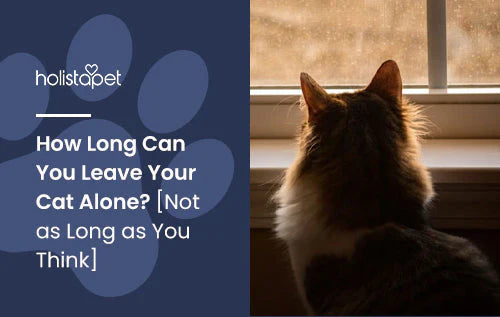While hiding is in a cat's nature, if your cat has never done something like this before, there are a few reasons for this drastic behavior change. The important thing to do is identify why your cat is hiding. From there, you can figure out how to comfort them and eventually get them out. Read on to learn the usual reasons cats end up creeping under the bed and the best way to get them to come back out.

Is It Normal for Cats to Hide?
Hiding might be normal for some cats and abnormal for others. A timid cat might feel at home sleeping underneath your bed, especially if guests come over. But if your cat is usually more confident and enjoys sprawling out on the rug in the center of the living room, it's probably not normal if they suddenly choose to hide in a small crevasse in the laundry room for most of the day.
Sometimes, even the most confident of kitties will rush to hide inside a box, or you may even find your cats in weird places. This could be due to situational things, like a new dog in the home or fireworks. Or it can be something internal, like pain from a disease or separation anxiety.
Normal Vs Excessive Hiding
If your cat is usually friendly with guests, there might be a problem if your cat suddenly sneaks into the bedroom when you have friends over. Something might have triggered them this time. Maybe one of the guests was getting too loud. Or maybe it was a new person they didn't trust. Maybe they even smelled like a dog. Just give your cat some time if they choose to distance themselves from a situation.
If your cat opts to stay hidden for long periods each day, there might be something concerning going on. It's also a sign of excessive hiding if your cat starts growling or hissing if anyone approaches them while they are trying to hide. If you sense that your cat is in distress or pain, their hiding may be excessive, and it's time to call the vet to make sure nothing serious is going on with your kitty and help them get the care they need.
Related Post: Cats and Fireworks: 12 Comforting Tips + Anxious Signals
Why Do Cats Hide?
Cats may be cautious creatures, but most cats don't act fearful or scared for no reason. Hiding is often normal cat behavior in response to various things, including fear, stress, pain, or even pregnancy. If you want to make sure your hiding cat is okay, the first step is to figure out what caused them to sneak off in the first place.
Fear
If someone tells you, "my new cat is hiding and not eating," now you know what to say. When your cat is afraid, their first instinct is to hide. A scared cat will not only hide but freeze in place, avoid the litterbox, and hiss, growl, and puff their tail. Cats become scared when they:
- Hear a sudden loud noise or see a sudden quick movement
- Are put into a new environment
- Come into contact with a new person or animal
- Are around a loud or rowdy person, including children
- Are in a scary situation, like a vet visit, long car ride, or trip
Stress or Anxiety
Similar to fear, cats will often respond to stress or anxiety by hiding. Cats are sensitive, meaning new environments or situations or a change in routine can upset them. If it's an ongoing situation, like a new apartment or roommate, it can build up into stress, which comes out in various symptoms:
- Hiding
- Vomiting and diarrhea
- Poor appetite and weight loss
- Bad coat condition
- Spraying furniture and urinating outside the litter box
- Excessive meowing
- Withdrawal from the family and other pets
- Pacing and yowling
Sickness
Hiding is the number one symptom to look for when you suspect that your cat is sick. If you notice accompanying changes in behavior or appearance (like neglected grooming or purring), take your cat to the vet immediately. Cats will also hide when their sickness is very serious, or they are dying.
Pain
Similar to sickness, a cat in pain will instinctively hide due to vulnerability. Having an injury or appearing weak will make your cat feel like a target, much like they would in the wild. Hiding makes them feel safe and comforted when they are experiencing discomfort.
Pregnancy
It's very common for cats to become reclusive during the final week of their pregnancy. They will seek out secluded spots in the house where they feel they can give birth safely and without drawing attention to themselves.
Natural Instinct
Hiding isn't always one of the cat behaviors to worry about. It is an instinctual behavior, making them feel comfortable and safe. This is why boxes are so popular with cats — even wild cats! Cats naturally enjoy being in places where they feel comfortable and secure. Just keep an eye on them and make sure there are no other signs or symptoms of fear, stress, pain, or sickness. If they appear perfectly fine, let your cat hide to their heart's content.

How to Get a Cat Out of Hiding
If the above advice doesn't get more timid or afraid cats to come out of their hiding spot, there are a few tricks you can try that might convince your kitty to finally come out.
Try CBD for Cats
CBD is a non-intoxicating cannabinoid that calms anxious cats by interacting with the receptors in their endocannabinoid system (ECS). It's often used to help soothe cats that are feeling a bit overwhelmed, aggressive, or scared. Providing your cat with a toy coated in CBD catnip spray or offering them a few CBD treats might ease how tense they feel.
Try Wet Food or Snacks
If your cat is hiding, try this trick. There's a chance they will rush out from under the couch to get some wet food. If not, try opening the food closer to where they are hiding. Place the wet food somewhere in the room, possibly just out of their reach. Your cat might not be able to resist.
Provide Them with Other Safe Places
Your cat might be hiding in undesirable spots in the home (like the dryer or in a dirty basement) because there are not enough areas for them to feel safe elsewhere in the home. Try these ideas if you want your cat to hide somewhere else:
- Cardboard boxes
- Cat trees
- Cat beds
- Warm blankets
When Should I Take My Cat to the Vet?
If you notice other signs of pain, illness, or anxiety — listed above — you will want to take your cat to the vet as soon as possible. Cats hide when they are injured or experiencing intense pain, meaning your cat may have something seriously wrong with them. Look for:
- Lethargic behavior
- Tail flicking, growling, hissing, swatting
- Lack of appetite
- Refusal to use the litter box
- Looking dirty and not cleaning properly

Final Thoughts
Hiding is normal behavior for a cat. It's in their instincts to hide, gives them comfort, and makes them feel safe. If your cat normally hides, don't be too worried. This is something they might even enjoy doing, so give them the time to themselves. But a cat may be hiding something serious when you find them squished under the couch.
Sometimes cats hide when they are in pain or when they are sick. Look for other signs, like not using the litter box or refusing to eat. If you are concerned that your cat is in distress, contact a vet immediately. If you don't think something is wrong, allow your cat to hide. They will come out to cuddle and play eventually!


 CBD Oil for Cats - Fast Acting
CBD Oil for Cats - Fast Acting
 CBD Cat Treats - Easy Dose
CBD Cat Treats - Easy Dose
 CBD Calming Chews for Cats - Highly Rated
CBD Calming Chews for Cats - Highly Rated
 CBG Oil for Dogs and Cats - Loved by Thousands
CBG Oil for Dogs and Cats - Loved by Thousands





Leave a comment
All comments are moderated before being published.
This site is protected by hCaptcha and the hCaptcha Privacy Policy and Terms of Service apply.